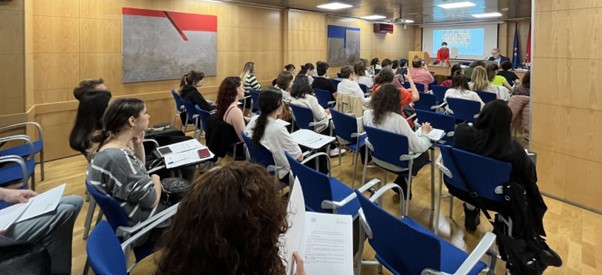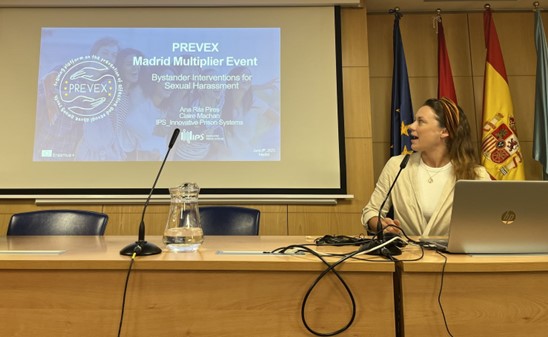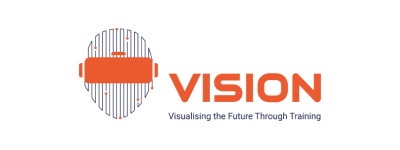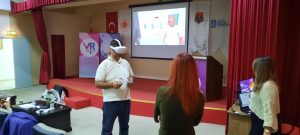With the aim of providing a balanced sexual education to youths, a consortium of eight partners across Europe is developing a comprehensive set of pedagogical toolkits and a complementary training platform for professionals working with young people. These resources cover key topics for potential adaptation with students, and are envisaged to support gender-based violence awareness and prevention among youths, especially university students.
Bystander awareness interventions as an inclusive approach to preventing sexual violence
In an effort to raise awareness and prevent sexual violence among young people, educational programmes have typically focussed on approaching the topic from the perspective of perpetration prevention (Salazar et al., 2014, 2019), or victimisation prevention (Gidycz et al., 2015; Nieder et al., 2020; Senn et al., 2017, 2021, 2022), targeting the respective gender-stereotyped roles for males and females.
The recent emergence of bystander interventions, however, tackles the issue by engaging all members of the community, irrespective of gender, in the fight against sexual violence, empowering them to hold others accountable and safely intervene to support (Banyard et al., 2004).
Such programmes often identify the “6 D’s” of bystander interventions, expanded from Dr. Dorothy Edwards’ pioneering ‘Green Dot Bystander Intervention Program’ at Kentucky University in 2006, which promotes various ways individuals can be proactive, instead of passive, when witnessing instances of sexual harassment of violence. These include:
1. Direct (Address the problem directly);
2. Distract (Interrupt the situation);
3. Delegate (Involve others, preferably an authority figure);
4. Delay (follow-up and check-in with the target);
5. Document (if you can’t intervene, take photos or videos); and
6. Defend (if someone else intervenes, help them).
This type of intervention has been found to be effective, not only in increasing people’s intentions to help, but also improving their actual bystander behaviours to be more proactive (Jouriles et al., 2020; Coker et al., 2011; Sargent et al., 2017).
Developing bystander intervention training resources for educational contexts
In this context, the PREVEX – Preventing Emotional and Sexual Abuse Among Young People – project emerges as a catalyst for change. The initiative addresses the pressing need to update academic knowledge on the criminal, and social dimensions of sexual deviance and promote sexual education that stimulates awareness and preventive behavioural patterns.
The project is creating a platform containing information and training resources aimed at professionals in educational settings and other fields working directly with young people. By equipping professionals and youth with tools to combat sexual violence, PREVEX aims to foster a protective culture where individuals are able to identify sexual violence and intervene or prevent it.
These developed resources include guidance on the implementation of Bystander Awareness Interventions that were presented to an audience of students, teaching professionals, and experts at the project’s first dissemination event.

The event provided a stage to share the project’s progress and several of the resources developed for the PREVEX E-learning platform. These innovative and interactive resources contain an extensive variety of pedagogical tools for educators and professionals working with youths, which can be easily adapted to teach students in a workshop format.
For example, the PREVEX Educator Toolkits, presented by the
partners from the University Rey Juan Carlos, are multilingual pedagogical kits
with videos to open the dialogue and to launch a debate and support tools to
approach and stimulate young people to reflect on these issues. The materials
broach a broad range of topics, namely:
– Sexual orientation and gender identity
– Relationship to the body: social, sexual and reproductive health
– Understanding sexual consent
– Romantic relationships: the first time
– Intimate Partner Violence
– Sexual offences and paedophilia
– Media and stereotypes of gender and sexual practices
The developed materials include an e-learning course on the different processes of emotional and sexual education. IPS_Innovative Prison Systems partners, presented materials taken from the e-learning’s 3rd module, ‘Preventing Sexual Violence: What can I do?’, providing facilitator guidance specifically on implementing Bystander Awareness Interventions.
A variety of tips were shared for enhancing youth awareness on the difficult topics of sexual violence and consent, with engaging activity examples, such a myth-busting quizzes and hypothetical scenarios that are adaptable to the target audience’s reality.

Other insightful presentations included an exploration of the contents and stakes of sexual education throughout history, and a systematic review of existing programmes to prevent sexual violence. These themes launched an interesting discussion on the strengths and limitations of different intervention programme approaches.
As an invited expert in sexual education evaluations, Frederique Xavier, from the University of Aix Marseille, shared her experiences in delivering international sex education sessions with children, and best practices for evaluating these programmes.
The second dissemination event in the scope of PREVEX is set to happen in October 2023 and will be held in Calabria, Italy. This will again be open for online participants, with registration available soon via IPS’s social media channels. The project consortium hopes to continue engaging a large number of participants and building prevention knowledge on the topics of Emotional and Sexual Abuse Among Young People.
*Project introduction derivated from research by project partner Sarah Tibbles from the University of Lille.
References
Banyard, V. L., Plante, E. G., & Moynihan, M. M. (2004). Bystander education: Bringing a broader community perspective to sexual violence prevention. Journal of Community Psychology, 32(1), 61-79. doi: 10.1002/jcop.10078
Coker, A. L., Cook-Craig, P. G., Williams, C. M., Fisher, B. S., Clear, E. R., Garcia, L. S., & Hegge, L. M. (2011). Evaluation of Green Dot: An active bystander intervention to reduce sexual violence on college campuses. Violence Against Women, 17(6). doi: 777–796. 10.1177/1077801211410264
Gidycz, C. A., Orchowski, L. M., Probst, D. R., Edwards, K. M., Murphy, M., & Tansill, E. (2015). Concurrent administration of sexual assault prevention and risk reduction programming: Outcomes for women. Violence Against Women, 21(6), 780-800. doi: 10.1177/1077801215576579
Jozkowski, K. N., & Peterson, Z. D. (2014). Assessing the validity and reliability of the perceptions of the consent to sex scale. The Journal of Sex Research, 51(6), 632-645.
Kleinsasser, A., Jouriles, E. N., McDonald, R., & Rosenfield, D. (2015). An online bystander intervention program for the prevention of sexual violence. Psychology of Violence, 5(3), 227-235. doi: 10.1037%2Fa0037393
Nieder, C., Bosch, J. F., Nockemann, A. P., & Kärtner, J. (2022). Evaluation of RISE: A Sexual Violence Prevention Program for Female College Students in India. Journal of Interpersonal Violence, 37(7-8), NP5538-NP5565. doi: 10.1177/0886260520959631
Orchowski, L. M., Gidycz, C. A., & Raffle, H. (2008). Evaluation of a sexual assault risk reduction and self-defense program: A prospective analysis of a revised protocol. Psychology of Women Quarterly, 32(2), 204-218. doi: 10.1111/j.1471-6402.2008.00425.x
Salazar, L. F., Vivolo-Kantor, A., Hardin, J., & Berkowitz, A. (2014). A web-based sexual violence bystander intervention for male college students: Randomized controlled trial. Journal of Medical Internet Research, 16(9), e3426. doi: 10.2196/jmir.3426
Salazar, L. F., Vivolo-Kantor, A., & Schipani-McLaughlin, A. M. (2019). Theoretical mediators of Real Consent: A web-based sexual violence prevention and bystander education program. Health Education & Behavior, 46(1), 79-88. doi: 10.1177/1090198118779126
Sargent, K. S., Jouriles, E. N., Rosenfield, D., & McDonald, R. (2017). A high school-based evaluation of TakeCARE, a video bystander program to prevent adolescent relationship violence. Journal of Youth and Adolescence, 46(3), 633-643. doi: 10.1007/s10964-016-0622-z
Senn, C. Y., Eliasziw, M., Hobden, K. L., Newby-Clark, I. R., Barata, P. C., Radtke, H. L., & Thurston, W. E. (2017). Secondary and 2-year outcomes of a sexual assault resistance program for university women. Psychology of Women Quarterly, 41(2), 147-162. doi: 10.1177/0361684317690119
Senn, C. Y., Eliasziw, M., Hobden, K. L., Barata, P. C., Radtke, H. L., Thurston, W. E., & Newby-Clark, I. R. (2021). Testing a model of how a sexual assault resistance education program for women reduces sexual assaults. Psychology of Women Quarterly, 45(1), 20-36. doi: 10.1177/0361684320962561
Senn, C. Y., Barata, P., Eliasziw, M., Hobden, K., Radtke, H. L., Thurston, W. E., & Newby-Clark, I. R. (2022). Sexual assault resistance education’s benefits for survivors of attempted and completed rape. Women & Therapy, 45(1), 41-67. doi: 10.1080/02703149.2021.1971425
Know more about this project

PREVEX
Preventing Emotional and Sexual Abuse Among Young People
The PREVEX project is promoted by the Militants Des Savoirs Association (France) and partnered by BSAFE LAB/Beira Interior University (Portugal), IPS_Innovative Prison Systems (Portugal), University of Calabria (Italy), University of Lille (France), Salzburg University of Applied Sciences (Austria), University Rey Juan Carlos (Spain) and University of Malta (Malta).
For further information about this project, please visit www.prevex-project.com
More Rehabilitation, Reintegration and Community Projects

STEP2LAB
Systematic Transition from Prison into the Labour Market

VISION
Visualising the Future Through Training

NEXT STEPS
Development and testing of a process chain for the placement of former detainees as specialists in the labour market

TRIANGLE
Secured digital education system for vocational skills for youngsters in closed institutions

TRAIVR
Training of Refugee Offenders by Virtual Reality

ViRTI
Virtual reality for training inmates

BLEEP
Blended Learning Environment for European Prisoners

VR4DRUG Rehab
Developing and Using Virtual Reality Technology for the Rehabilitation of Drug Users in Probation Services

Coding-OUT
Coding in prison as a valuable OUTside tool for employment

RE[ENTER]
Strengthening the capacity of criminal justice professionals and volunteers
Related news

IPS-partnered initiative using VR technology to reduce reactive aggression in prisons awarded “Best Innovation Project” in Romania
Read More »
Enhancing child-friendly juvenile correctional training across Europe: IPS presents key findings at CRS 2025
Read More »



